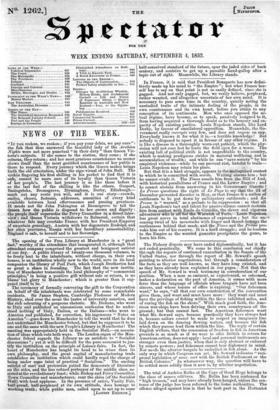The Fishery dispute may have ended diplomatically, but it has
not ended practically. We come to this conclusion not chiefly through the reports of continued exacerbation in the Senate of the United States, nor through the report of Mr. Seward's speech pointing to ulterior negotiations, but through a consideration of the facts as they are well known, as they have long existed, and as they have already been explained in our pages... Not that the speech of Mr. Seward is weak testimony in corroboration of our position. When a man so eminent, so exiierienced, so esteemed, makes a declaration on the part of America, it comes with more force than the language of officials whose tongues have not been sincere; and whose tenure of office is expiring. . "Our fishermen. want," he says, "all that our own construction of the convention gives them, and want and must have more :‘ they want and must have the privilege of fishing within the three inhibited miles, and. of curing the fish on the shore." . With much good faith, the Ame- rican war-ships have been driving their own countrymen off the ground ; but that cannot last. The American fishermen want what Mr. Seward says, because practically they have always had it, because sailors cannot be made to respect an imaginary line laid down on the dancing flowing waters, and because the fish which they pursue lead them within the line. The reply of certain English writers, that the concession of freedom to fish in American_ grounds is as much as if we were to offer British in return for American cotton, does not apply : local and personal incitements are stronger even than justice, when that is only abstract or enforced by remote powers ; and fishermen cannot bear diplomacy in mind. Nor needs the ulterior bargain be embodied in fish alone. As the only way in which Congress can act, Mr. Seward indicates "reci- procal legislation of some sort with the British Parliament or the British Colonies." In whatsoever way,- the question will have to be settled more solidly than it now is, by ulterior negotiation.


























